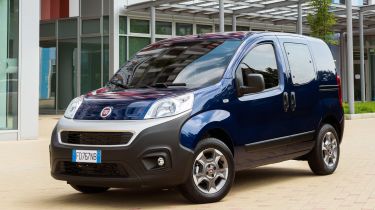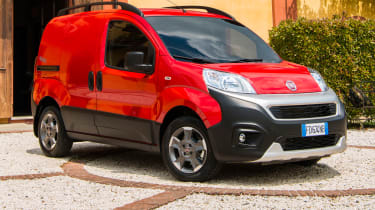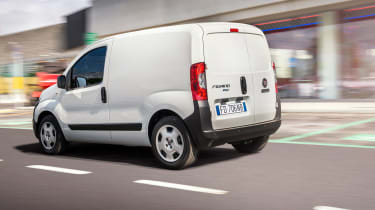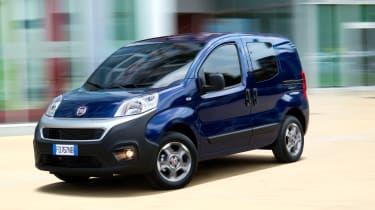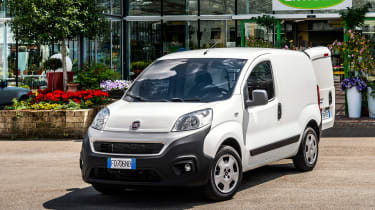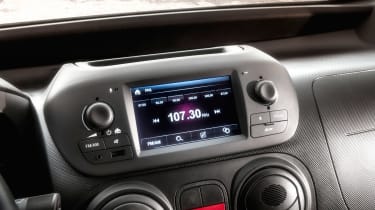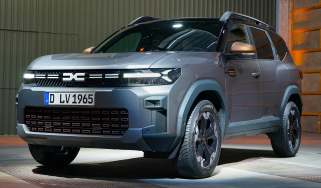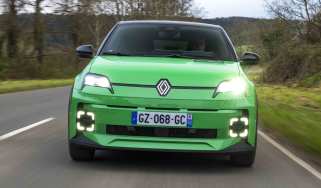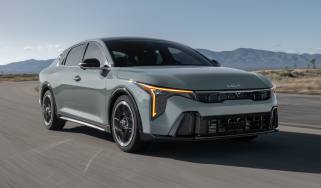Fiat Fiorino van review
The Fiat Fiorino van comes in Cargo and Combi versions, and was updated in 2016
The Fiat Fiorino is the smallest van the Italian company builds - sitting underneath the Doblo, Talento and Ducato. It's a compact one-box urban van which offers more load capacity than a comparable car-based van like the Ford Fiesta van or Vauxhall Corsavan.
The Fiat Fiorino is built alongside the Peugeot Bipper and the Citroen Nemo at Fiat's plant in Bursa, Turkey. The three vans are nearly identical, only offering up slightly different front grilles. Following an upgrade in 2016 all three vans use Fiat's 1.3-litre Multijet engine, and the Fiorino is also available with a wheezy 1.4 petrol in the cheapest version.
The Fiorino is available as a standard or Combi crew van with two or five seats, but if you want a plusher interior there's also a people-carrier version named the Qubo.
The Fiorino is also available in Adventure form, with Fiat’s Traction+ electronic differential locking system, increased ground clearance and larger wheels for occasional off-road use – although there’s no Fiorino 4x4.
The Fiorino Combi offers a second row of seats that can be folded forwards to provide additional load space. The passenger seat in the regular Fiorino Cargo can also be folded flat, with a hinged-mesh bulkhead wrapping around the driver’s seat, to extend the load space for longer loads.
More reviews
In-depth reviews
Standard spec models are pretty basic, but you do get steering height, lumbar support and seat height adjustment, a radio/CD player, a nearside sliding side door, and electronic stability control with ABS and EBD, plus a speed limiter. The SX model adds central locking and deadlocks, electric windows and mirrors.
If you want infotainment, there’s a 5-inch touchscreen satnav, although older pre-2016 models used a TomTom option.
MPG, CO2 and Running Costs
Fiat offers a 1.4-litre Fire petrol engine in the cheapest version of the Fiorino, with 76bhp and combined fuel economy of 40.1mpg. However, the majority of buyers will opt for the 1.3 MultiJet diesel, which is Euro 6 compliant and has 79bhp.
YOu can add stop-start and other efficiency measures by going for the Ecojet version, leading to a combined fuel figure of 72.4mpg and CO2 emissions of 104g/km. Without stop-start, the diesel returns 64.2mpg.
The Fiorino drives through a standard five-speed manual gearbox to the front wheels, although an automated Comfort-Matic version is also available as an option. This provides automatic gear changes without the losses associated with a full automatic transmission. Service intervals for the Fiorino are set at 21,000 miles.
If buying privately, one point to note is depreciation - the Fiorino and its Qubo passenger-car sibling are some of the worst-depreciating models in the UK, losing over 70% of their value in the first three years of ownership.
Load Space and Practicality
For such a compact van – its overall length is just 3.8 metres – the Fiorino offers a surprisingly spacious load bay. The 2.5 cubic metres of load volume can be extended to 2.8 cubic metres by folding flat the optional retractable passenger seat and swivelling the bulkhead round to the side of the driver. This also provides a maximum load length of 2,491mm.
A sliding side loading door is standard, and offset twin rear doors provide easy access to the load area, with a floor height from the ground of just 530mm, making it easy to load. A second sliding side door is optional.
While similar in footprint to car-derived light vans such as the Fiesta, the Fiorino delivers a much more competitive payload of up to 660kg, compared to just 500kg in the Ford. That's similar to lighter versions of vans in the next class up, such as the Renault Kangoo and the Citroen Berlingo, making the Fiorino an ideal urban delivery van.
The Fiorino Combi provides the additional versatility of a second row of seats behind the driver. Available in two versions, the Combi offers M1 (car specification) seating for up to five people and a 175kg load capacity, or N1 (LCV) seating for four and up to 293kg of payload.
The rear seat can be folded or removed completely, to provide the full 2.5-cubic-metre load area of the Cargo version, if required. A ladder bulkhead is standard on Cargo models and the Fiorino can be supplied with a full-panel bulkhead or a bulkhead with a window. Roof bars are standard on the Adventure models, and optional on other vans. The Fiorino has a towing capacity of 1,300kg.
Reliability and Safety
The Fiorino comes with a driver’s airbag, ABS brakes with EBD electronic brakeforce distribution, and the ESP electronic stability programme is now standard-fit too. If you pick the Adventure package, you can also add the optional Traction+ system for awkward terrain.
Passenger and side airbags are available on the options list, while rear parking sensors can also be added, though they are standard on the Tecnico specification.
Fiat’s Fiorino, along with the Peugeot Bipper and Citroen Nemo, have been winning compact urban van awards since the trio were launched in 2008. There have been no major reliability issues, other than general wear and tear, and oil-change intervals are set at 21,000 miles. Fiat provides the van with a three-year/120,000-mile warranty.
Aside from an ignition key and manual door locks, basic models in the Fiorino range come with little more than a locking petrol cap in the way of security. Deadlocks are standard from SX models up though, as is remote controlled central locking. An alarm system is optional across the range.
Driving and Performance
The Fiorino is not intended as a long-distance motorway cruiser, though the van copes well with higher-speed inter-urban travel. Where it excels, however, is in town and on local country roads, where the compact dimensions, lively engine performance and quick steering make the Fiat an enjoyable van to drive.
The short wheelbase and load-carrying suspension can make the ride a bit choppy when unladen, but the Fiorino holds the road well. The five-speed manual gearbox is light and easy to use, while the Comfort-Matic automated gearbox makes reasonably smooth progress.
Though riding slightly higher, the Adventure model handles equally well and its Traction+ system provides extra grip if you need to tackle muddy lanes or construction site roads. It would also prove reassuring if you regularly drive in poor winter conditions.
Cab and Interior
Despite its compact dimensions, the Fiorino provides plenty of room for taller drivers. The standard van has a fairly minimalist interior, with hard and, in places, flimsy-looking plastics. The driver’s seat is supportive and comfortable for longer journeys, however, the optional fold-flat passenger seat is thin and can prove uncomfortable. As part of the 2016 upgrade, the van had a redesigned steering wheel with remote audio controls, there are new instrument graphics, and a new dashboard storage compartment. A five-inch touchscreen with Bluetooth and DAB radio is also available, with satnav as an option.
The basic Fiorino comes with a height-adjustable steering wheel, driver’s seat armrest and lumbar adjustment, a height-adjustable driver’s seat and a radio/CD player. The SX trim adds remote central locking, electric windows and mirrors, and a rear compartment lock in the cab. Opt for the Adventure model, and you get Traction+ with ESC electronic stability control, roof bars and larger wheels.
There's also a Tecnico version of the Fiorino. This adds fog lights, reverse parking sensors, stop-start, air-conditioning, Blue&Me audio controls on the steering wheel, the folding passenger seat, Fiat’s Blue&Me infotainment system with ECO:Drive Professional, and a TomTom sat-nav with a powered mounting point in the top of the dash.
Van dimensions
| Body style | Height | Width | Length |
| Standard van | 1,721mm | 1,716mm | 3,864mm |
| Combi van | 1,721mm | 1,716mm | 3,864mm |
(Widths are body width without mirrors. With mirrors: 2,019mm)
Load area dimensions
| Body style | Height | Width | Length | Volume |
| Standard van | 1,205mm | 1,473mm | 1,523mm | 2.5m3 |
| Combi van | 1,205mm | 1,473mm | 740mm | 1.3m3 |
(Widths are maximum, width between wheel arches is 1,046mm)
